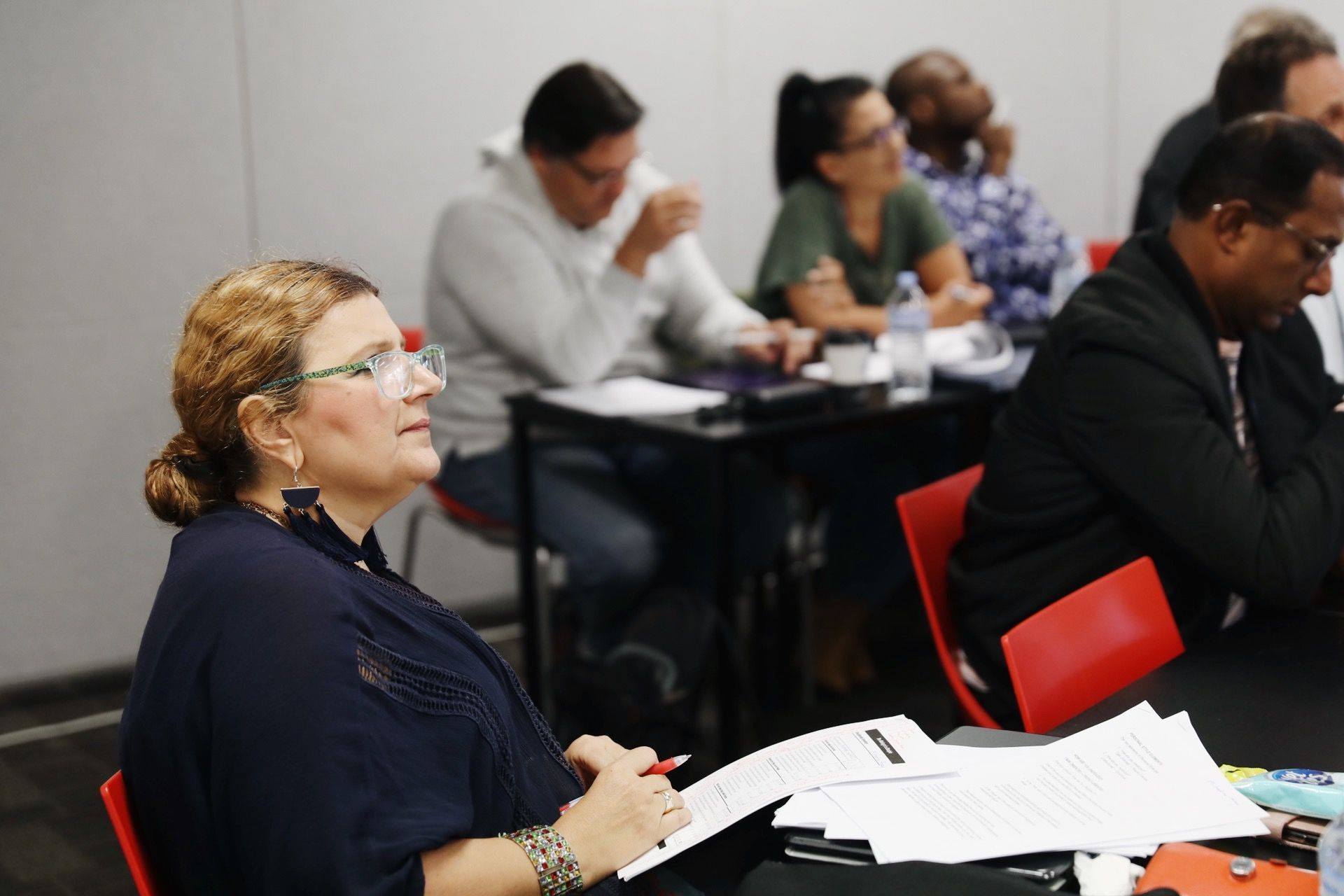Diploma of Ministry
The Christian ministry landscape and context is radically evolving. AC’s Diploma of Ministry (DipMin) addresses these changes and equips the next generation of Christian leaders for your unique calling in ministry.
The DipMin will expand your theological knowledge and help you gain a deeper understanding of the Bible through the insightful class content that develops study skills that will last a lifetime.
You will have the opportunity to apply your knowledge through practical ministry opportunities in your local church and the community.
Are you ready to apply for Semester 2, August 2024?







Preparing you for ministry in today’s world, this course provides you with a thorough foundation in theology and biblical studies, shaping a Christian worldview that will directly connect to your vocation – and in addition you will find opportunities to gain the practical expertise required for ministry, and make a positive contribution to society.
You will be able to develop your writing and communication skills, and be able to demonstrate an ability to apply a body of knowledge in a range of ministry contexts. This course of study draws on AC’s established expertise in the area of ministry.
This course structure is based on two semesters (each of 13 weeks duration), with four subjects taught in each semester totalling 80 credit points.
Subjects offered at our campus:
Discover the foundations of a Christian worldview. In this subject, students will learn to define a Christian worldview and express basic elements of their own worldview. Students will discover how worldview is important for personal spirituality and vocation.
Itching to connect the realm of the classroom with some real-life experience? Professional Practice is designed with just this aim in mind. Students will have the have the chance to engage academically with issues pertaining to their Major Specialisation plus experience a hands-on placement.
Working with an experienced supervisory mentor, students will complete a 100 hour placement over the course of semester(or split into 50 hour placements over 2 semesters), with a variety of formats to choose from. For instance, do you have a heart for youth leadership? You could complete 8 hours a week at your local church, working with the youth department. Or perhaps you have visions of becoming the next CEO of World Vision? A block placement at a Christian organisation, working with a field specialist, could be the kick start you need. Alternatively, have you been wanting to make a difference while experiencing cross cultural ministry overseas? Your 100 hours could be served with an overseas mentor in a concentrated three or so weeks of professional practice. The sky is the limit!
MIN001 Introduction to Pastoral Ministry
In this introductory unit, students will explore a broad variety of topics that form the very basis of pastoral ministry. Primarily, students will consider contemporary pastoral models that connect academic reflection with the real world. Topics discussed will range from defining ministry, calling and ordination to conflict resolution, and being effective in caring for others. Students will also be provided with ample opportunity to engage creatively with these topics to make connections with their own contexts.
MIN012 Character Formation and Ministry
Ever wondered if there were other ways to express faith, apart from lifting your hands during worship? Would you like to deepen the spirituality of your local Christian community, but find yourself hesitating, uncertain of the appropriate boundaries? Students with these questions and more will find themselves challenged as they partake in this foundational unit, designed specifically to introduce charismatic and Pentecostal Christians to the broader history of Christian spiritual approaches. In doing so, students will have a chance to connect with their heritage and participate in a broad range of spiritual exercises practiced by the wider body of Christ throughout history.
BIB009 Old Testament Foundations
The foundational documents of the Christian Faith are found in the Old Testament. It is the first instance of God’s self-revelation to humanity, it points forward to Jesus, and it provides glimpses of the Holy Spirit at work. The themes, theology, wisdom, history, and narrative form the basis for anything the New Testament has to teach us. This Subject will equip you to uncover the significance and relevance of the Old Testament to being a disciple of Jesus.
BIB010 New Testament Foundations
The New Testament is an exciting document that outlines the life, death, and resurrection of Jesus and the early writings of the church. This subject will introduce the purpose, content, and message of the New Testament books with particular focus on the historical and cultural implications of their setting, and how this broad diversity of literature presents an incredibly unified and coherent message.
THE005 Introduction to Theology
Do you have questions about God that you have been unable to answer? Do you sometimes wonder whether Christian beliefs about things like the Trinity and the divinity of Jesus make any sense? This unit provides you with the opportunity to explore those beliefs that are foundational to Christianity. It argues that what we believe about God (our theology) has a practical impact upon our life and ethics and, therefore, provides an overview of Christian faith, and reflects on the ways in which this faith informs our everyday life and calling. The topics addressed range from the doctrine of God, creation and sin, to discussion on the person and work of Christ, and the nature of the coming kingdom of God.
Have you ever wished that you could bottle the persuasiveness and power of your favourite preacher in order to supercharge your own sermons and see your congregation transformed? When it comes to sermons, the bridge between the first century text and twenty-first century context can often seem longer than 2000-odd years. If you want to discover what turns effective preaching into life-changing preaching, and bring revelation to postmodern people that struggle with the Christian story, then look no further. Get ready to be equipped with the rhetorical tools in this unit to craft a message so powerful that it will be impossible for your audience to leave the pews unchanged.
Academic
Applicants with Recent Secondary Education (within the past 2 years)
Applicants admitted on the basis of their recent secondary education must demonstrate the completion of NSW Higher School Certificate (or the completion of an International Baccalaureate or the interstate or overseas equivalent qualification and result) for admission into this course.
Applicants with Vocational Education and Training (VET) Study
Applicants whose highest level of study enrolment since leaving secondary education is a Vocational Education and Training (VET) course must demonstrate the completion of an AQF Level 3 Certificate III or higher by an authorised institution or registered training organisation for admission into this course.
Applicants with Higher Education Study
Applicants whose highest level of study enrolment since leaving secondary education is a complete or partially complete higher education qualification must demonstrate the completion of an AQF Level 5 Higher Education Diploma (or higher) by an authorised institution for admission into this course.
Applicants with Work and Life Experience
If you are under the age of 21 at the time of commencement, you can apply to a prescribed program of non-award study on the basis of provisional entry, and complete the provisional entry qualifying period to become a full candidate of this course.
If you are over the age of 21 at the time of commencement, you can apply for admission into this course on the basis of provisional entry, and complete the provisional entry qualifying period to become a full candidate.
Language
Overseas students are required to demonstrate their English proficiency skills. Such students admitted into our programs must attain an overall IELTS (or equivalent) score of 5.5 (with no score below 5.0 in any of the four skills areas). IELTS (or equivalent) is not required for applicants who have undertaken five years of required higher education study (or equivalent) in English from an approved country or who have completed a Certificate IV or higher qualification awarded in English under the Australian Qualification Framework by an authorised institution or registered training organisation.
